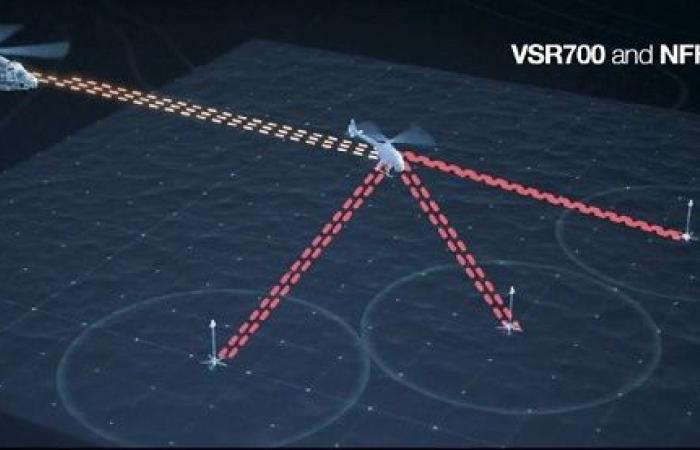Since 2017, under the aegis of the General Directorate of Armaments [DGA] Airbus Helicopters and Naval Group develop the Navy's aerial drone system [SDAM] from the VSR-700 demonstrator, designed from the Cabri G2 light civil helicopter from the French manufacturer Gimbal.
One of the objectives of this program is to ultimately have a remotely piloted aircraft capable of automatically landing on a frigate, whatever the sea state, thanks to the Deckfinder system. According to Airbus Helicopters, this allows drones to be launched and recovered “with an accuracy of 10 to 20 cm, in difficult conditions, independently of satellite geolocation devices. [GNSS/GPS] ».
“We are on the verge of achieving a very big technological breakthrough on SDAM. […] Automatic landing of a helicopter drone on a boat has never been successful until now. If we succeed, it will be a real breakthrough in terms of drones,” explained Admiral Nicolas Vaujour, Chief of Staff of the French Navy. [CEMM]in October 2023. Shortly before the first – successful – tests of this VSR-700 aboard the multi-mission frigate [FREMM] Provence.
However, the SDAM program was under threat for a time. At least, that's what Senator Cédric Perrin suggested in July 2022, during a hearing with Sébastien Lecornu, the Minister of the Armed Forces. And this due to “technical difficulties”. At the time CEMM, Admiral Pierre Vandier indicated that it was going to be “examined as part of the work on the military programming law with a view to ensuring cost/performance/deadline convergence”.
At the time, the SDAM was the subject of some criticism, with some believing that this new drone, due to not being able to carry ammunition, would not provide “decisive” military capabilities compared to the S-100 “Serval” put into operation. work by amphibious helicopter carriers [PHA].
Finally, the concept of SDAM has since evolved. Indeed, last week, during the last edition of the Euronaval show, Airbus Helicopters announced its intention to equip this aircraft with new capabilities, particularly in terms of anti-submarine warfare. [ASM]without renouncing those relating to ISR missions [renseignement, surveillance, reconnaissance].
Thus, the solution found by the industrialist consists of providing this aerial drone with four side baskets [deux de chaque côté] can hold a total of four SonoFlash sonobuoys [fournies par Thales] and/or four anti-submarine charges offered by Naval Group. Everything would be connected to the MAD ER magnetic anomaly detector [Magnetic Anomaly Detection Extended Role].
In such a configuration, and thanks to its optronic sensors [toujours utiles pour repérer un périscope, par exemple]a SDAM/VSR-700 could thus track a submarine in collaboration with the NH-90 Caïman NFH helicopter [Nato Frigate Helicopters]equipped in particular with the light, high-immersion low-frequency sonar “Sonar Flash”, a MAD and MU90 torpedoes. All of this would contribute to increasing the ASM capabilities of the FREMMs [dont la réputation n’est déjà plus à faire] as well as that of future defense and intervention frigates [FDI].
The addition of this mission “kit” will make the SDAM/VSR-700 gain a little mass… which will reduce its “endurance”, which is normally eight hours, for a range of 150 km.
As a reminder, the SDAM/VSR-700 must be able to fly at an altitude of 5,000 meters, at a speed of 185 km/h thanks to a 145 hp engine, while being equipped with a Diades C-Ranger 200 radar, a Wescam MW-10 optronic ball and an AIS receiver.
The Military Programming Law [LPM] 2024-30 provides for the acquisition of 8 examples by 2030, the objective then being to equip all so-called first-rate ships with them by 2035.






